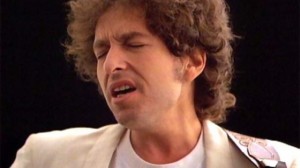By 1983, Bob Dylan’s mid-70s creative peak of Blood on the Tracks and Desire seemed very small in the rear view mirror. Divorce, money troubles and a declining sense of artistic purpose led him to embrace a particularly strident strain of evangelical Christianity, and his resulting albums sold progressively worse while alienating more and more listeners. Whatever his spiritual convictions, his professional pride was sufficiently wounded to spur him into making something of a comeback. The result was Infidels.
 Produced by Mark Knopfler, Infidels brought a crisp, digital sheen to Bob Dylan’s music. With Knopfler joining ex-Rolling Stone Mick Taylor on guitar and dynamic duo Sly and Robbie providing the rhythm section, Infidels certainly sounded fresh, if a bit uncharacteristic. More encouragingly, the writing showed marked signs of artistic renewal. The album opener “Jokerman” is classic Dylan: mystifying yet lucid, bathed in Biblical imagery but far more subtle and complex than a simple “religious song.” The Infidels sessions yielded a bonanza of new compositions, many of which would remain in the vaults for years … and this is where we start having to fix things.
Produced by Mark Knopfler, Infidels brought a crisp, digital sheen to Bob Dylan’s music. With Knopfler joining ex-Rolling Stone Mick Taylor on guitar and dynamic duo Sly and Robbie providing the rhythm section, Infidels certainly sounded fresh, if a bit uncharacteristic. More encouragingly, the writing showed marked signs of artistic renewal. The album opener “Jokerman” is classic Dylan: mystifying yet lucid, bathed in Biblical imagery but far more subtle and complex than a simple “religious song.” The Infidels sessions yielded a bonanza of new compositions, many of which would remain in the vaults for years … and this is where we start having to fix things.
While Infidels saw Dylan reclaim some of his songwriting powers, as a producer and editor he remained erratic, and the album’s approved sequence is perhaps the most famous missed opportunity in Dylan’s catalog. Here is the album as the world knows it:
Side 1
“Jokerman”
“Sweetheart Like You”
“Neighborhood Bully”
“License to Kill”
Side 2
“Man of Peace”
“Union Sundown”
“I and I”
“Don’t Fall Apart on Me Tonight”
What could have been an astonishing return to form instead became a tantalizing near-classic. It all basically comes down to “Blind Willie McTell.”
If you’re a Dylan fan, you know “Blind Willie McTell,” and you know the story behind it. This performance — just Dylan on piano and vocals and Knopfler on acoustic guitar — is one of the most chilling, awe-inspiring moments ever captured in a recording studio, the song with which Dylan once and for all secures his equal standing alongside the progenitors of American roots music: Charley Patton, Woody Guthrie, Frank Hutchison, Robert Johnson, and Blind Willie McTell himself. It recreates the fires of the Civil War, the smell of magnolia blooms, an era of cruelty side by side with gentility, and laments that there are no more singers who can give voice to this world — except, of course, for this singer, singing this harrowing song.
And Dylan didn’t like it. Didn’t think it was good enough. Well, to be fair to him, he thought it sounded unfinished, and it does, at least in comparison to the muscular tracks laid down by the full studio band. (There is a full-band version of “McTell,” nowhere near as good as the acoustic performance.) But honestly, who cares? No one in possession of his senses would hear that track and complain that it has no business on the album without a Robbie Shakespeare bass line. Restoring “Blind Willie McTell” to Infidels by itself raises the album to landmark status, and with the addition of one more outtake from the sessions, you have yourself a true high-water mark of ‘80s Dylan.
“Foot of Pride” continues the religious preoccupations of “Jokerman,” sketching a picture of a fallen world run by grifters and phonies and offering a subdued but pointed warning: “Well there ain’t no going back/When your foot of pride come down/Ain’t no going back.” Had Dylan channeled his religious fervor into songs like these, the world would have largely been spared the likes of Shot of Love and Dylan’s career may have had no need of rescuing by the early ‘80s.
So what goes over the side to make room for these classics? I think the first casualty has to be “License to Kill,” a leaden effort that wrenches the album to a halt for the sake of a pro-environmental message that includes a baffling critique of the moon landing. For the second, it’s a tight decision between two simplistic and nearly interchangeable rockers, “Neighborhood Bully” and “Union Sundown.” It comes down to what sticks in your craw the least, Dylan the pro-Zionist or Dylan the anti-capitalist. I narrowly favor the latter, so “Neighborhood Bully” is out.
This, then, is how my reconfigured Infidels goes:
Side 1
“Jokerman”
“Sweetheart Like You”
“Union Sundown”
“Blind Willie McTell”
Side 2
“Man of Peace”
“Foot of Pride”
“I and I”
“Don’t Fall Apart on Me Tonight”
I’ve resisted the temptation to completely pull the album apart and rebuild it with other session outtakes. I’m leaving “Tell Me” and “Lord Protect My Child” for The Bootleg Series I-III and sparing “Tight Connection to My Heart.” Dylan very nearly got Infidels right on the first pass, and a few substitutions are all you need to earn the “best since Blood on the Tracks” crown six years before Oh Mercy.
